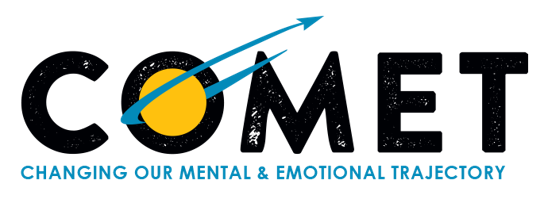Enhance resilience
Resilience is the ability to bounce back after experiencing challenges in our professional and/or personal lives. We can build resilience by either experiencing those challenges or by strategically anticipating situations and altering the outcomes when possible.
There are also different levels of resilience. Our team at Community Health Engagement and Outreach strives to influence the individual level to the community level. Individual resilience is how one person bounces back after experiencing challenges; community resilience is how the community bounces back after experiencing challenges. We do not define what those challenges look like as they can be different for different people or communities. We aim to help you and your community to be able to better respond to challenges as they arise so that everyone in your community can thrive!
Models and programs such as Promoting School-community-university Partnerships to Enhance Resilience (PROSPER), WeCanPROSPER Resilience Training (WRT), Changing Our Mental and Emotional Trajectory (COMET), Recovery Friendly Workplace (RFW), and others can help participants strategically build their resilience.
Youth Training
MU Extension’s Community Health Engagement & Outreach (CHEO) is partnering with communities across Missouri to create sustainable programs for promoting positive youth development and strong families, and to facilitate translation of prevention science into widespread community practice by utilizing the evidence-based delivery system PROSPER (an acronym for PROmoting School-community-university Partnerships to Enhance Resilience). The PROSPER model provides the framework for impactful community partnerships between MU Extension, local school districts, and additional community-based organizations focused on improving opportunities for youth and families. Through the expansion of this community partnership, a local PROSPER Team is created to support the implementation of two evidence-based programs with middle school students and their families: Strengthening Families Program for Parents and Youth 10-14 and Botvin LifeSkills Training.
Strengthening Families Program
The Strengthening Families Program for Parents and Youth 10-14, is a 7-session series delivered to middle school students and their parents/caregiver. It is offered in the evenings or on weekends. As a universal program, any family can benefit from the tools, skills and strategies included in the series. The World Health Organization named the Strengthening Families Program for Parents and Youth 10-14 as the #1 prevention program out of 6,000 programs analyzed for long-term effect on substance use and misuse.
LifeSkills Training
The Botvin LifeSkills Training Middle School program is a groundbreaking substance abuse and violence prevention program based on more than 35 years of rigorous scientific research. Proven to be the most effective evidence-based program used in schools today, LifeSkills Training is comprehensive, dynamic, and developmentally designed to promote mental health and positive youth development. In addition to helping kids resist drug, alcohol, and tobacco use, the LifeSkills Training Middle School program also effectively supports the reduction of violence and other high-risk behaviors.
Adult Training
Changing Our Mental and Emotional Trajectory (COMET)

Changing Our Mental and Emotional Trajectory (COMET) is a 2-hour training for older youth and adults to support friends, family, acquaintances, colleagues, and neighbors’ well-being. It recognizes the rural values of neighbor helping neighbor, and communities being their own best resource, especially when concerned about another’s emotional well-being. During the training, participants will engage in a conversational guide to learn natural ways to support others in their community and spend some time practicing conversations to be “the other person” that changes the trajectory of someone’s emotional well-being.
WeCanPROSPER Resilience Training

WeCanPROSPER Resilience Training (WRT) was created in 2020 in response to an identified need that not all communities are ready to implement PROSPER as a delivery model. Therefore, Partnerships in Prevention Science Institute created a program that trains adults on strategies to build their personal resilience. The intention behind the training is that resilient adults create resilient communities and raise resilient children. The training includes a personalized assessment to quantify your resiliency in financial wellbeing, healthy living, positive relationships, sense of accomplishment, sense of purpose, sense of resilience, and stress/emotion balance. Participants then learn example strategies to improve resiliency in each category and end the training with time spent creating an action plan to improve at least one category. Trained facilitators guide participants through the training and are available to assist participants in the action planning process. A Clearinghouse of vetted resources are also available to training participants.
For additional information on how your community can benefit from becoming a PROSPER Community, please contact Emily Poncher at emilyponcher@missouri.edu.
WeCanPROSPER Resilience Training Facilitator Training
WRT Facilitator Training is available for those participants who would like to share what they have learned in WRT with their networks.
*Pre-requisite: Participate in a WeCanPROSPER Resilience Training
*Facilitator training is virtual via Zoom and broken up over 4 days.
Day 1
Day 1 of training is about 3 hours and will cover most of the training information. On this day, you will also be assigned a co-facilitator for subsequent training dates.
Day 2
Day 2 will preferably be a week later and will last about 30 minutes. On day 2, you will begin planning a WRT session as a facilitator and have an opportunity to ask additional questions.
Day 3
Day 3 of training will be a 2.5-hour WRT session during which you will co-facilitate with a fellow trainee to a group of participants.
Day 4
Day 4 will be a reversal of roles with your co-facilitator for another WRT session to familiarize yourselves with the full presentation.